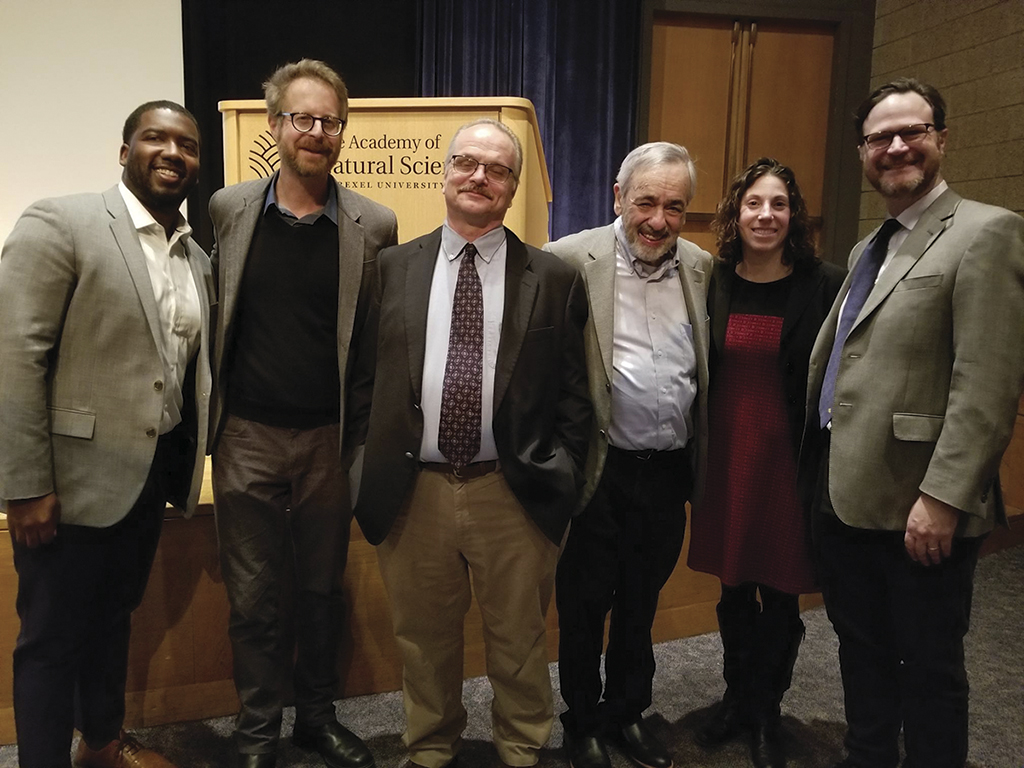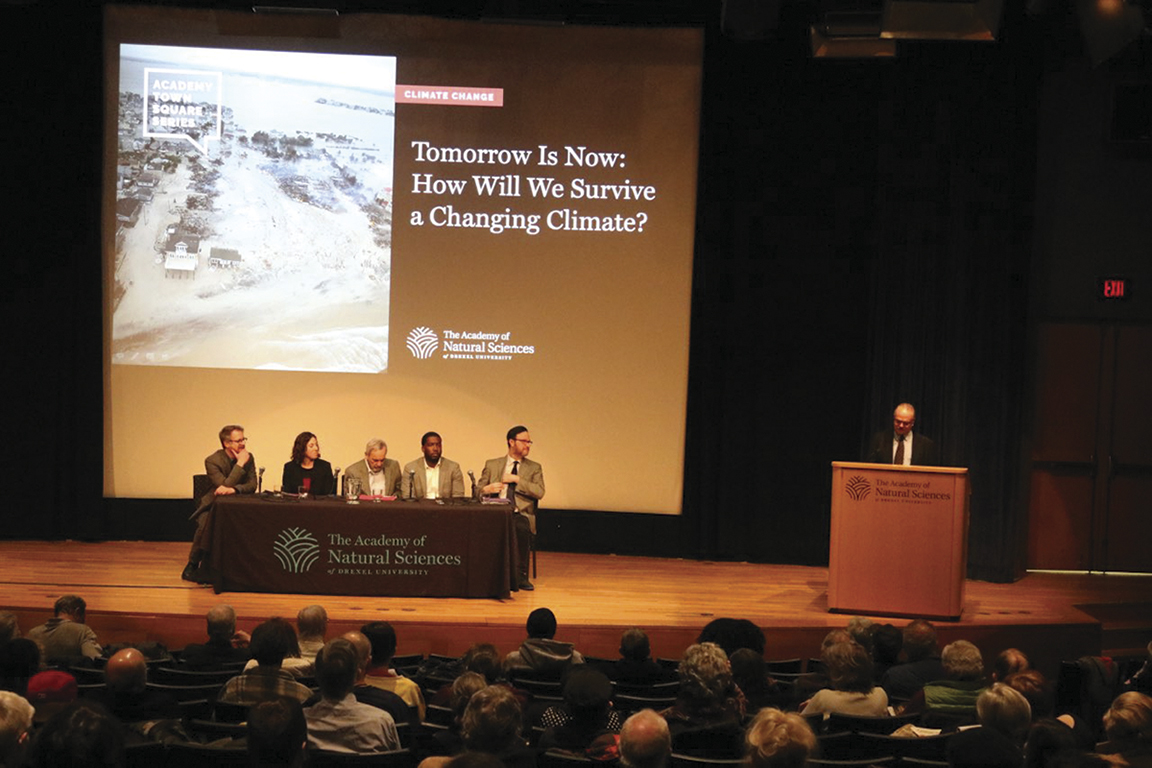
A panel held at The Academy of Natural Sciences of Drexel University March 4 titled “Tomorrow Is Now: How Will We Survive a Changing Climate?” focused primarily on the steps the city of Philadelphia is taking to combat climate change.
Moderated by urban disaster expert and head of Drexel’s Department of History, Scott Knowles, the panel included Saleem Chapman, deputy director of sustainability of the City of Philadelphia; Howard C. Kunreuther, a professor of decision sciences and public policy and co-director of the Risk Management and Decision Processes Center at The Wharton School at the University of Pennsylvania; Mira S. Olson, an associate professor in the civil, architectural and environmental engineering department at Drexel; and Nathaniel Popkin, an author, editor and historian.
Chapman first mentioned how the Office of Sustainability has been contributing to the climate change fight in a variety of ways. In addition to publishing the first climate production publication in Philadelphia in 2014, the department has also published “Growing Stronger,” a report that identified vulnerabilities and existing climate resilient strategies in 2015.
However, he said that the next step for the office is city-wide adaptation planning in order to create an in-depth engagement process for all of those who reside in Philadelphia.
“Even though climate change affects everyone, not all people are impacted equally,” Chapman said. “Many factors such as racism, health status, income and wealth can influence the communities sensitivity to climate change.”
He showed a map of Philadelphia, proving this point through racial and income data mirroring the neighborhoods’ vulnerability towards climate change. Chapman also mentioned that this difference is related to which neighborhoods have been gaining tree coverage.
Since the process should be community driven towards proposing social collusion and social capital, workers in the Office of Sustainability went to several neighborhoods in North Philadelphia and engaged people in a six-month process where more than 500 citizens were surveyed in order to foster the trust in the people and obtain a solution to this issue, which he said could be in the capacity of the community.
Chapman concluded that the plan will be released in the incoming months, and it will have to do with cooling centers to lessen the effects of hot days in the community.
Kunreuther, the second panelist, said that it is difficult for humans to identify the high consequences of climate change due to our intuitive thinking where we do not have the experience of past global crises like this one. He said that we do not have the intuition to respect this phenomenon, and a set of systematic biases that do not serve us well in terms of how to deal with this, often take over our thinking process.
He proposed to focus on more deliberate thinking in order to look at the tradeoffs in our decisions. He said that it is important to highlight the interconnections in communities and to simultaneously think about long-term strategies — though he added that it is extremely hard to do this.
Kunreuther referenced the book he co-authored,“The Ostrich Paradox: Why We Underprepare for Disaster.” He spoke of some of the biases that prevent people from understanding the consequences of climate change. Some phenomena he described are miopia, when people limit their horizons of the benefits of acting for this cause; amnesia, when people, after some years, forget the sequels of natural catastrophes and stop being precocious; optimism, when people think that the probabilities of global warming having any results are really low in the most proximate years; inertia, when people advocate for keeping the status quo rather than chang with it; simplification, when people believe the issue is below their area of concerns; and the hurting effect,when, among the community, people are not worrying about it and others start to question then why should they worry as well.
Olson brought the conversation back to Philadelphia, speaking about how rising sea levels are affecting some of the water systems in the city.
She explained that the city’s water systems are drained from storms where water and water waste are gravity driven.
“As the sea level rises, that difference in the height of the water decreases and water, as you know, goes from high to low, and when the difference between the water sources is even, there is no flow of water,” she said.
Once the water does not flow, the water waste and the incoming water remains stuck and may lead to a flood or a shutdown of Philadelphia’s water systems, she said.
She said this poses a serious question: what to do with the city’s infrastructure. She went on to explain that sea level is also related to the salt line.
There are two water intakes to the city of Philadelphia: the Delaware River, which has freshwater and its intercepting intake, the Atlantic Ocean, which has saline water. If the sea level increases, the salinity line may affect the Delaware River and our drinking water, she added.
Popkin, the last panelist, introduced his speech with a phrase from his opinion piece published in the Philadelphia Inquirer Feb. 27.
“Each one of us is responsible for the spiraling consequences of actions produced collectively across vast time and space — an impossible fate for a moral being” he said.
He raised two questions. The first question he posed is who will be responsible for combating climate change: future generations, like his grandchildren when they suffer the consequences of it, or the present generation? The second question was what can individuals in society do?
There are 89,000 government units in the U.S., and many operate in contradiction to each other regarding this issue, making it more difficult to manage the environmental crisis that has been merging for decades and not having any political response as other crises like the Holocaust, Popkin said.
He said that scientists and policy makers mask this by calling it a period of man’s apparent domination of the Earth, while he describes this phenomenon as the dynamic of an interconnected gesture of global warming, deforestation, extinction, mining exploitation, among other issues.
Consequently, he mentioned that climate change is not addressed because of two aspects: the inside aspect where people justify themselves as saying it is not in their control, and the outside aspect where people cannot imagine to an extent what to do.
“No one can stand and talk about the ecological crisis and global warming for more than five minutes or the other person would walk away, so this event tonight is wonderful,” Popkin said.
He said another reason for the paralysis of action towards this issue is the questioning of people: who are they to save the planet from getting worse, and who are they to be responsible for climate change?
“Everyone is more than capable of accounting all of the kinds of people in the world of climate change. Everyone is in equal parts problematic and in no way given the political order of reconcile in thousands,” Popkin said.
To conclude the panel, the audience was granted the opportunity to ask questions.
The panelists were asked what the city of Philadelphia is doing to lessen the consequences of climate change. Olsen answered that the water planning systems of the city are being productive towards the issue, and Popkin added that the city has a history of knowing how to overcome problems so he thinks they will also overcome this one.

